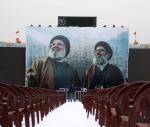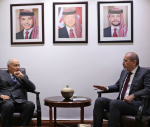You are here
A passion for justice
Jul 20,2020 - Last updated at Jul 20,2020
Washington’s elites, like Hollywood’s, can be quite shallow, placing value on titles, wealth, or appearance. Back in the 1990s, my wife Eileen and I were invited to a dinner hosted by a wealthy socialite whose political contributions had earned her a presidential appointment and a title. At one point in the evening, she went around the room showing off her guests. Because I was heading up a project for vice president Gore promoting Palestinian economic development, she went on at length about my work supporting Palestinian rights. She then came to my wife, who had no title, and after a pause said “And this is Eileen. She’s married to Jim.” It was a hurtful slight. She had no idea who Eileen really was.
In fact, my journey to Palestine began with Eileen, 50 years ago. Back then I was a newly married graduate student in the Department of Religion at Temple University. In addition to my studies and teaching, I was involved in anti-war, civil rights, and student rights movements.
I was taking a break from activism to prepare for my Masters’ comprehensive exams. While I was attempting to study, Eileen was reading Bury My Heart at Wounded Knee, the compelling story of the betrayal and dispossession of America’s indigenous peoples.
Eileen, who possessed a fierce sense of justice, was outraged, repeatedly interrupting my study to share her fury at each atrocity and broken treaty. When she finished this book, she picked up another, The Evasive Peace, by John Davies, the first head of UNWRA. The outrage and interruptions began anew. She was struck by the similarities: The promises betrayed, the treaties broken and the indigenous people dispossessed of their land and dispersed from their ancestral homes. She was deeply troubled that we, both educated people, had learned none of this history during our schooling.
At one point, while reading the Davies book, she said to me “We didn’t know this. And these are your people, and you aren’t doing anything about it.” That’s when my journey began.
This was not the last lesson I learned from Eileen. She passed away four months ago and left me, our five children, and our thirteen grandchildren with a passion for justice that will live on in our hearts and actions.
After passing my comprehensives, I began to address the issue of Palestine in student meetings and rallies, only to find out that there was a price to pay for this advocacy. A few months later, on Eileen’s birthday, we received a letter threatening my life, “Arab dog, if you set foot on campus, you will die.” Days later, as I was teaching, the Jewish Defence League gathered outside my room, chanting and threatening violence. A group of Black students in my class went out into the hall and peacefully removed them. While the fear from this incident remained, so did our commitment to justice.
A year later, Eileen, our first-born, and I packed our bags and set off for Lebanon and Jordan. I had received a grant enabling me to spend time in refugee camps collecting stories of the Nakba. After days of interviews, as I was leaving the Ein Al Hilweh camp in Lebanon, an old woman grabbed my arm and said to me “We’ve told you our stories, now what are you going to do with us?” On the flight home, I said to Eileen, “I don’t think our lives will ever be the same.” And they were not.
A few years later, while teaching at a Pennsylvania state college, I launched the Palestine Human Rights Campaign, a coalition of civil rights, anti-war and religious leaders. Our home became “PHRC Central”. My children recall stuffing and stamping envelopes with appeals on behalf of victims and they remember hosting Palestinian Mayors, Israeli lawyers and activists who defended Palestinians, and prisoners whom we had helped to free.
During this period, in addition to helping me, Eileen also became involved in a number of other issues. She started a children’s reading room at a local bookstore, began a women’s group, and together with some friends helped launch a local farmer-to-consumer co-op.
I received tenure, spent a year commuting to a post-doctoral stint at Princeton, and returned to teach another year, after which we made the decision to sell our home and risk the insecurity of running a non-profit and moved to Washington to run the PHRC. At the time we had three young children and whatever qualms Eileen might have had, she supported our decision and remained committed to what was to become our vocation.
During the ups and downs of the next four decades, Eileen was there with me. We started the American Arab Anti-Discrimination Committee in 1980, Save Lebanon in 1982, to provide medical treatment for children victims of Israel’s bombing of Lebanon, and the Arab American Institute in 1985. In between, I took time off to serve as a deputy campaign manager for Jesse Jackson’s 1984 presidential run and co-chair the project launched by Gore in the 1990’s.
The death threats, and one fire-bombing of my office, continued. As did periods of financial insecurity. I was on the road quite a bit organising Arab Americans. Eileen never forgot the time when Fayzeh, a child whose leg had been shattered by a cluster bomb, arrived at our home to begin her six month stay seeking medical treatment. Just moments after she arrived, I had to leave to begin a three-city tour to raise money to support Save Lebanon. Fayzeh did not speak any English and Eileen only knew a smattering of Arabic. When I returned after three days, I found that Fayzeh, our children, and Eileen had become quite a team.
From the beginning of my public speaking career, whenever Eileen was present, I was speaking to an audience of one. In the very early years, I was prone to using language that was a bit too raw or harsh. When I did, I could see Eileen wincing. When I went on too long, she gave me the cut-off sign. Afterwards, she’d tell me how many “winces” she’d tallied. Eventually, I was able to make it through entire speeches without one. Eileen did the same with my writing and, up until the very end, she was my best editor.
As our children grew, we began to travel together. Eileen came with me to a number of Jesse Jackson events and Democratic Party conventions. Together, as a family, we were able to visit Lebanon, where we visited my father’s village, Jordan, Kuwait, UAE, Saudi Arabia, Egypt and Ireland, where we searched for Eileen’s roots. Because Eileen developed a passion for Ireland and its history, especially the Great Famine and the suffering of the Irish at the hands of the British, she and I made many repeat visits to the country.
Through it all, Eileen’s commitment to justice and support for my efforts were the constants on which I anchored my life and my work. She also found new causes to embrace: Reform in the Catholic church, gun control, LGBT rights, healthcare reform and disability rights. And she was passionate about Bernie Sanders. Above all, she was a committed mother, grandmother and conveyor of values to our family.
I stopped working after Eileen had a stroke in November, 2019 and was with her every day for months. The only trip I made while she was hospitalised was at her insistence. I was asked to go as a Sanders surrogate to speak at a Martin Luther King Day event honoring Jesse Jackson. When I returned and played the video of the speech for her, she loved it. There were no winces.
Over the years Eileen tempered my speech and my soul and made me the person I am today. Her commitment to justice helped shape and orient our children to pursue justice in their diverse callings: Civil rights and immigration reform, disability rights, protection of the environment and equity and justice in higher education and elementary education. They and I are Eileen’s legacy. We would not be who we are if not for her passion and selfless care.
Washington’s elites may not get that, but we do.
The writer is president of the Washington-based Arab American Institute












